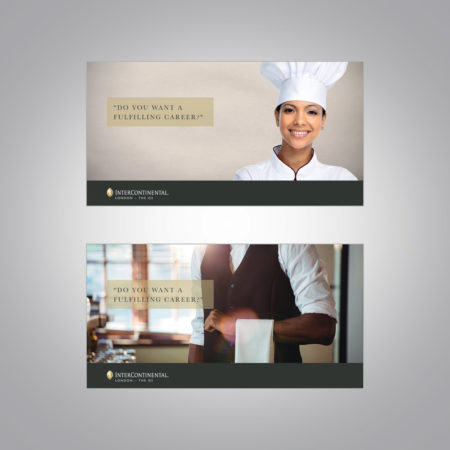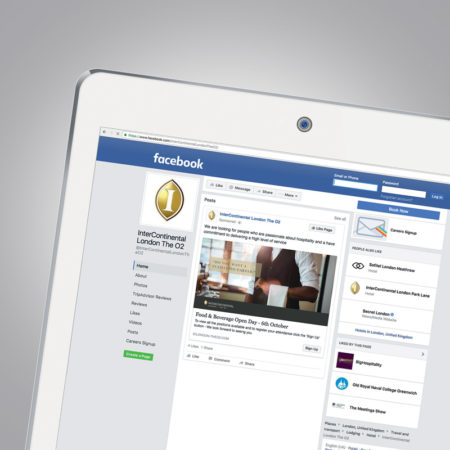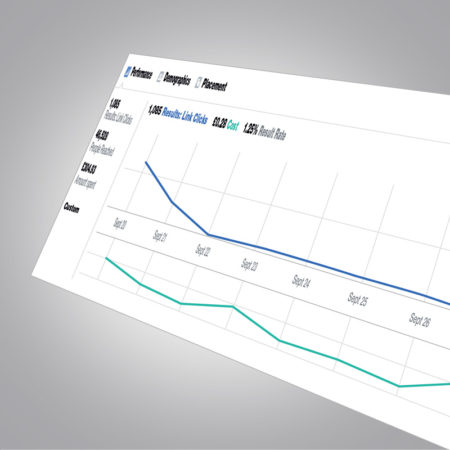Facebook recruitment campaign saves tens of thousands of pounds
Overview
The InterContinental O2 London had the objective of saving tens of thousands of pounds on recruitment fees.
They wanted to find over 25 Room Attendants and Meeting Sales Executives, and promote two recruitment Open Days: one for Food & Beverage and the other for Chefs.
Facebook advertising was the chosen channel for this campaign (rather than Linkedin) due to the type of people we were looking to attract and the lack of sophisticated targeting on Linkedin Ads
Client
InterContinental O2 London
Category
Social marketing and advertising
Objective
Recruitment campaigns

Strategy
Each of the positions and the open days required the creation of their own adverts, with the target audience to be clearly defined.
The imagery and text of the adverts could then be made specific to each audience; but more importantly, the targeting of the advertising spend could be focused on people that were more likely to respond.
Challenge
The campaign was launched and in the first 24 hours we achieved over 1,000 interested candidates who clicked the advert to register their interest for the position. We were very happy with this result. Unfortunately, the client’s HR department reported only 3 people applying. This was terrible (approximately 0.3% conversion rate) and there had to be a reason for it.
We paused the campaign so as to not waste any of our customer’s budget. After a speedy investigation and analysis we found that 90% of the traffic from the adverts was coming from mobile devices. We then tested the user experience on mobile devices and discovered two critical factors:
1. The careers page we were sending candidates to had them ‘Apply Now’ where they were taken to a third-party recruitment website. Unfortunately this website was not responsive or usable on mobile devices (buttons and data fields were too small) so people dropped out of the journey.
2. The third-party recruitment website was asking people to upload their CV and a covering letter and create an account (all from their mobile). Currently as a rule, people do not tend to have their latest CV or a relevant covering letter stored on their phone, so again the journey was abandoned.
Solution
The following solutions were implemented:
1. Eliminating the use of the third-party recruitment website and sending applicants to an InterContinental page where people could register their interest for their preferred position.
2. Encouraging candidates to register their interest first with a simple useable form and then following up later to request their CV and covering letter – thus shortening the journey and being conscious of what the user wanted.
Result
The campaign was switched back on again, achieving a further 2,500 clicks over the following 3 days. There were over 110 applications for the advertised vacancies: an impressive result.
The difference that Big Marketing’s solution made to the problem was significant: a new conversion rate of 4.4%, vastly improving on the previous 0.3% rate.
However, this made the client’s HR department incredibly busy as they had a lot of admin and communication tasks to perform prior to the interview and open days, and many of these tasks had not been automated.
This was a valuable pointer to the client for future recruitment drives. Crucially, the benefits of targeted advertising, a shorter application process and an increased conversion rate meant a pool of quality candidates from which to make a selection.
The obvious benefit of not using a recruitment agency saved tens of thousands of pounds on recruitment fees and started to build a database of interested candidates for future vacancies.
Conclusion
There are always lessons to learn from every social advertising campaign (due to it changing and evolving so rapidly). Here are the top take-aways from this campaign:
- Choose a channel where your audience is.
- Ensure your offer is specific and attractive to them.
- Use the amazing targeting tools of Facebook.
- Analyse the progress of the campaign.
- Be mindful where the traffic is coming from and what you want it to do.
- Analyse the user experience on mobile devices (ALWAYS).
- Make the journey as short as possible.
- Plan to automate admin roles to save time and money.



